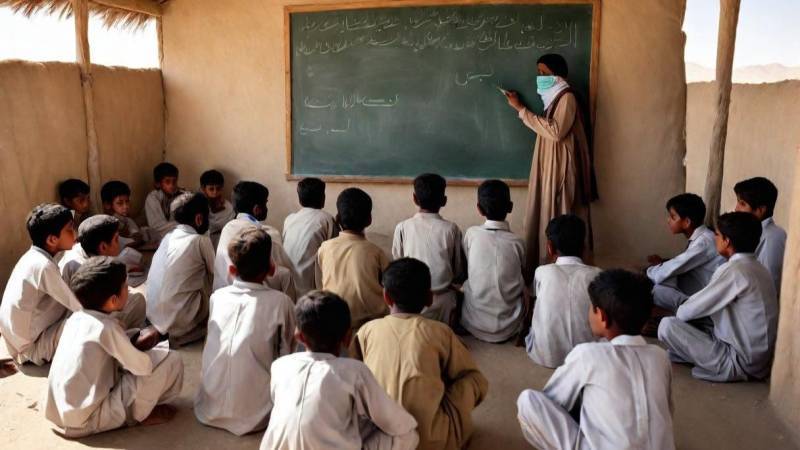
The purpose of education is universally understood to be enlightenment, social mobility and progress. However, if we review the situation surrounding Pakistan's education system, we find it has become completely antagonistic to these goals.
Our current predicament is the result of redundant and discriminatory education policies. If this neglect and status quo is allowed to continue, then Pakistan's education system will reach the lowest level of degradation, incompatible with the demands of the modern world.
Although access to quality education is a basic human right, in Pakistan, the education system is stratified such that access to that right is determined based on one's social and economic background. There is a stark difference between the quality of education available for the rich and the poor. The powerful elite openly flout the concept of meritocracy in education and manipulate results to their will. The advocates of the merit system have been systematically suppressed.
There is no bigger example of this than what happened to Micheal A. Thompson, the former principal of Lahore's Aitchison College. Although his letter did not specify exact reasons for tendering his resignation, media reports suggested it was his frustration with unwarranted interference and directives from the Governor House to accommodate certain individuals. He opposed the meddling of politics and nepotism in schools. Thompson had also tendered his resignation in September 2018 before then-Governor Chaudhry Muhammad Sarwar, who later convinced him otherwise. That resignation was precipitated by pressure from the college's Board of Governors to grant admission to the son of former MNA Kashmala Tariq in A-levels after he was expelled earlier on disciplinary grounds.
In 1960, the United Nations Educational, Scientific and Cultural Organisation (UNESCO) adopted the convention against discrimination in education. Over 60 years later, Pakistan has yet to ratify this convention. It can be argued that the stranglehold of the ruling elite and lack of accountability are the reasons behind this delay.
Before we assess the quality of education in Pakistan, it should be asserted that an alarming 26.2 million children are out of school, representing 39% of the school-age population. This number is greater than the population of some 150 countries worldwide. The Constitution of Pakistan enshrines the fundamental right of free education for every child from five years to 16 years in Article 25-A - inserted after the eighteenth amendment in 2010. However, the government has failed to provide functional public sector schools in the country's remote areas. This condemns residents of these areas to a long life of misery, of working under the same feudal lords, and condemns their future generations to work for meagre compensation while lacking the tools to break free of this vicious cycle. It is universally acknowledged that access to quality education provides opportunities to learn new skills and climb the social ladder. Pakistan would certainly benefit from a skilled workforce to develop economically, and democracy would flourish once people were able to make informed and educated voting decisions rather than acquiescing to feudal or tribal control. To end inequality and poverty in society, however impossible it may appear, providing access to quality education is the first step.
The government should implement modern solutions to provide quality education, train teachers with world-class techniques and introduce Project Based Learning programmes
Currently, three parallel education systems operate in Pakistan: the elite private schools for the upper class, public-sector schools, and the Madrassahs for religious education. Per the Economic Survey 2021-23, Pakistan has about 82,600 functional primary schools, 46,800 middle schools, 34,800 secondary schools and 7,648 secondary/intermediate colleges.
Of the public schools, only a few are functional; most have poor infrastructure and unskilled teachers, while they follow an outdated curriculum. They lack specialised labs and equipment for their students. All of this boils down to constant negligence on the part of the government. Despite pressures from global bodies to increase the education budget to 4% of the Gross Domestic Product (GDP), Pakistan allocated 1.91% of the GDP for education in the budget for the fiscal year 2024-2025. According to a World Bank report, 65% of fourth graders do not meet the necessary competency level in reading.
Public and private bodies have taken some positive initiatives to provide quality education in Pakistan. For example, the Daanish school initiative of the Punjab government has been designed to provide quality education to marginalised and underprivileged kids, especially in underdeveloped areas. The schools have modern infrastructure, including well-built classrooms, properly-equipped laboratories, and other facilities. The unique curriculum at Daanish schools focuses on enhancing skill sets and fostering creativity among students. Similarly, the government should implement modern solutions to provide quality education, train teachers with world-class techniques and introduce Project Based Learning (PBL) programmes. Students would benefit from the practical implementation of their textbook concepts. We should do away with the rote-learning system and teach students to think critically and analytically. The existing curriculum should be reformed to adopt STEM (Science, technology, engineering and mathematics) education to help students learn modern skills.
Needless to say education reform that ensures equal and quality education for all should be the utmost priority of the government. The local government system should work effectively to implement reform policies thoroughly. Furthermore, the budget for education should be increased to address the issue of out-of-school children and to build better-equipped schools for them.
In May 2024, PM Shehbaz Sharif declared an educational emergency in the country and vowed to enroll the 26 million out-of-school children. To deliver on these promises, the government must demonstrate an iron will, build a professional task force at the provincial levels, and ensure accountability.

